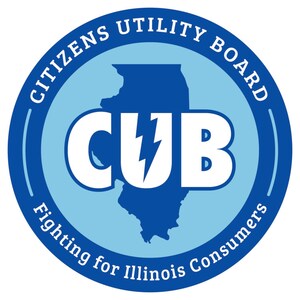CHICAGO, July 29, 2020 /PRNewswire/ -- With the right electric vehicle (EV) policies, Illinois can deliver cleaner air, low-cost transportation options and lower energy costs for all consumers, particularly in neighborhoods most burdened by pollution, poverty and high power bills, the Citizens Utility Board (CUB) argues in a new analysis released Tuesday.
At a time when the global pandemic and nationwide protests against racial injustice shine a harsh light on stark inequalities, CUB's 20-page guide, "EV for All: Electrifying Transportation in Low-Income Communities," argues for placing low-income neighborhoods at the center of future EV policy.
With vehicle pollution now the worst driver of climate change, transportation electrification has significant potential benefits for the planet and consumer pocketbooks—"but not if low-income communities are left in the rear-view mirror," according to CUB's guide, at CitizensUtilityBoard.org.
Illinois already has a model for strong EV policy in the Clean Energy Jobs Act (CEJA), comprehensive energy legislation proposed in Springfield, the guide concludes.
"Our message has always been that the right EV policy benefits everyone, even people who don't drive electric vehicles," CUB Executive Director David Kolata said. "Up until now, the communities that could most benefit from EVs have too often been denied those benefits. But with creative solutions, Illinois policymakers can use vehicle electrification as a mechanism to reduce energy and transportation costs as well as pollution for low-income neighborhoods. We are advocating for strong clean energy policy—like the Clean Energy Jobs Act—that brings EV benefits to everyone in the state."
CUB's guide illustrates how underserved Chicago neighborhoods, often near transportation corridors but far from good transit options, suffer from disproportionate exposure to air pollution and have been hit hardest by respiratory ailments, including Coronavirus. Not only could cleaner forms of transportation help make communities healthier, but CUB, a watchdog group that fights for lower energy costs, argues that they also can help reduce the "energy burden" in those areas.
For example, CUB's research team found that policies that encourage EV owners to charge their cars when electricity costs are low (typically in the middle of the night) could help manage power grid costs and spark up to $2.6 billion in cumulative energy savings for all consumers—even those who don't drive EVs—over the next decade.
Without the typical machinery, such as a transmission, EVs are cheaper to maintain, and the cost to travel is usually less than the gasoline equivalent of $1 per gallon. While EV prices may still be too steep for many families, CUB proposes creative solutions to deliver EV benefits to low-income neighborhoods—many ideas that could be tested in pilot programs in those neighborhoods:
- Income-based rebates for used EVs and home chargers.
- Income-based swap programs to encourage trading-in internal combustion cars for EVs.
- Geo-targeted public charge station development (with discounts for local residents).
- Low-cost "last-mile" transportation options, such as car-sharing, e-scooters and e-bikes.
- E-transit buses that are targeted for communities in "transit deserts." (In a test program, two e-buses saved the City of Chicago $54,000 a year in fuel and maintenance costs.)
- The electrification of municipal fleets (police cruisers, garbage trucks, snow plows). Municipal transportation hubs in low-income neighborhoods could also serve as EV charging stations for the general public.
- Electrification of commercial trucks.
Many of these ideas are included in proposed state legislation, the Clean Energy Jobs Act (CEJA). "Policymakers can prepare for a future when EVs dominate Illinois roadways by putting low-income neighborhoods at the center of a comprehensive EV plan," Kolata said. "The Clean Energy Jobs Act would be a major victory for securing a clean, affordable energy future for all Illinois consumers."
CUB recommends Illinois create a strategic plan for delivering transportation electrification benefits to low-income areas, seeking input and participation from residents of those areas and a wide range of stakeholders. Also, utility-implemented EV programs must stress accountability. They should be tied to performance, including incentives for improving affordability of electric service, efficiency of the grid and increasing use of electrified transportation in low-income areas, according to the guide. Plus, any vendors receiving public or utility funding for electrification should be subject to reasonable standards and consumer protections.
The guide is the third in CUB's ABCs of EV series, in which it highlights important electric vehicle policies Illinois should adopt. Download it at the Research page of CitizensUtilityBoard.org.
CUB represents the interests of residential and small-business utility customers and has saved consumers more than $20 billion by helping to block rate hikes, secure refunds and fight for clean, low-cost energy. For more information, call CUB's Hotline, 1-800-669-5556, or visit www.CitizensUtilityBoard.org.
SOURCE Citizens Utility Board

Related Links
http://www.citizensutilityboard.org
WANT YOUR COMPANY'S NEWS FEATURED ON PRNEWSWIRE.COM?
Newsrooms &
Influencers
Digital Media
Outlets
Journalists
Opted In





Share this article